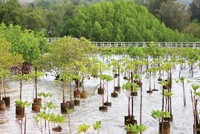Advertisement
Grab your lab coat. Let's get started
Welcome!
Welcome!
Create an account below to get 6 C&EN articles per month, receive newsletters and more - all free.
It seems this is your first time logging in online. Please enter the following information to continue.
As an ACS member you automatically get access to this site. All we need is few more details to create your reading experience.
Not you? Sign in with a different account.
Not you? Sign in with a different account.
ERROR 1
ERROR 1
ERROR 2
ERROR 2
ERROR 2
ERROR 2
ERROR 2
Password and Confirm password must match.
If you have an ACS member number, please enter it here so we can link this account to your membership. (optional)
ERROR 2
ACS values your privacy. By submitting your information, you are gaining access to C&EN and subscribing to our weekly newsletter. We use the information you provide to make your reading experience better, and we will never sell your data to third party members.
Environment
Climate Change Threatens Food Security
by Britt E. Erickson
December 7, 2015
| A version of this story appeared in
Volume 93, Issue 48
Chemists and chemistry students: Follow key developments connected to the Paris climate change meeting here.
Climate change threatens to roll back much of the progress toward ensuring there is enough food to feed the world’s population, which is expected to reach 9 billion by 2050, a report from the U.S. Department of Agriculture concludes. Released last week at the climate change conference in Paris, the report highlights the impacts of a changing climate on global food availability, access, use, and stability. Climate change has led to more invasive pests, diseases, and extreme weather, including droughts and wildfires, costing farmers billions in lost productivity. Such losses have led to food shortages and price increases, interrupted transport, and diminished food safety, particularly in poor and tropical regions, the report notes. USDA has established regional climate hubs to advise U.S. farmers on ways to adapt to climate change, and the agency seeks to integrate climate change into its conservation and renewable energy programs. Agriculture produces 24% of the greenhouse gas emissions, including methane from rice paddies, that cause climate change, according to the United Nations.



Join the conversation
Contact the reporter
Submit a Letter to the Editor for publication
Engage with us on Twitter